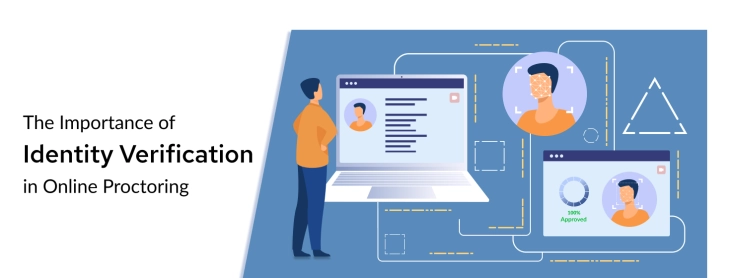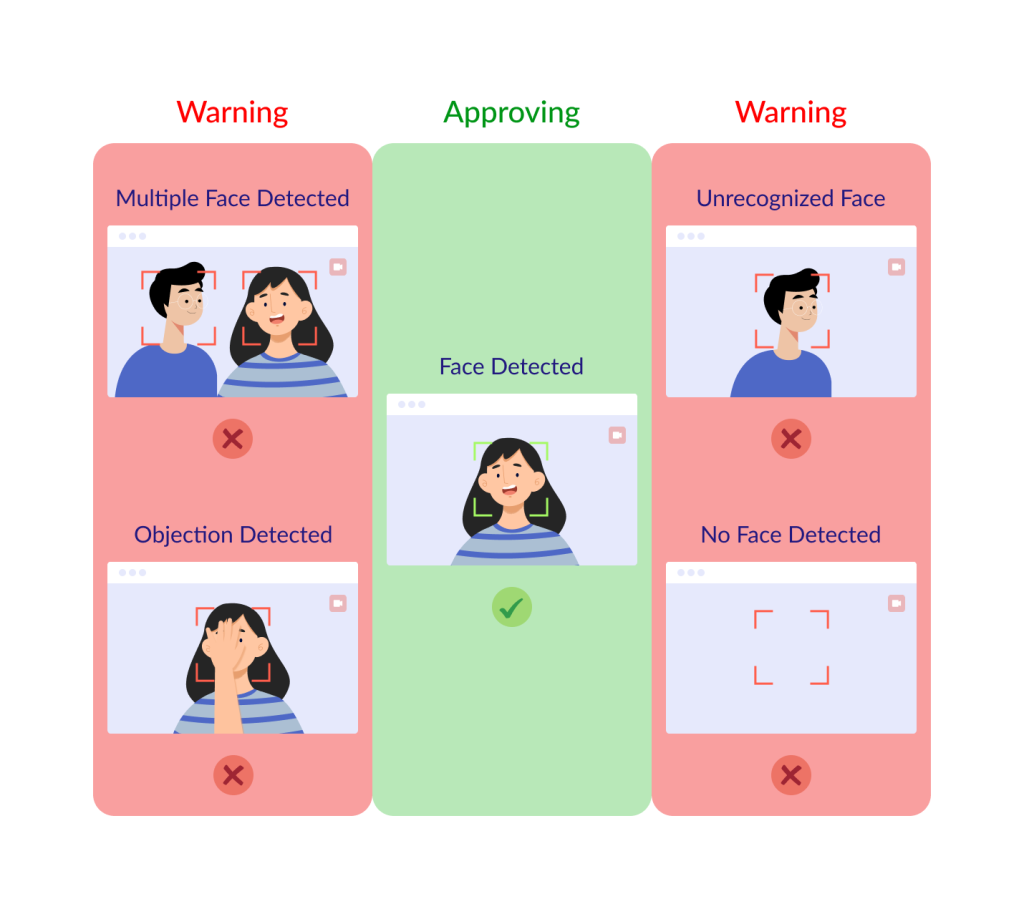
According to a report by ResearchAndMarkets, the global online proctoring market is expected to grow at a CAGR of 21.5% from 2021 to 2028, reaching a value of $1.3 billion. As online education grows, the need for secure and reliable online proctoring solutions has become more pressing than ever. With the increasing adoption of online proctoring, it is essential to understand the role of identity verification in ensuring the security and integrity of online assessments.
Identity verification is a crucial aspect of online proctoring that cannot be overlooked. But what exactly is identity verification in the context of online proctoring?
Identity verification in online proctoring refers to the process of confirming the identity of a test-taker to ensure that they are who they claims to be. This involves verifying the test-taker’s identity through various methods, such as biometric authentication, government-issued ID verification, or other forms of authentication. Identity verification is essential in online proctoring because it:
- Prevents Impersonation: Ensures that the person taking the test is the actual student, not someone else pretending to be them.
- Maintains Academic Integrity: Prevents cheating and ensures that students are held to the same standards, maintaining the validity of the assessment results.
- Protects Student Data: Identity verification helps to protect student data and prevent identity theft, ensuring that sensitive information is kept confidential.
- Deters Cheating: Identity verification serves as a strong deterrent, discouraging students from attempting to cheat since they know their identity will be authenticated and any cheating attempts will be caught.
2. The Risks of Not Verifying Identity in Online Proctoring
While online proctoring has revolutionized the way exams are administered, it also introduces new risks and challenges. One of the most significant risks is the lack of identity verification, which can have severe consequences for institutions, students, and employers. Failing to verify the identity of students taking online exams can lead to a range of cheating methods, including:
1. Impersonation: A person other than the registered student takes the exam, often with the student’s knowledge and consent.
2. Identity Fraud: A student creates a fake identity or uses a stolen identity to take the exam, often to conceal their own identity or to impersonate someone else.
3. Proxy Testing: A student hires someone else to take the exam on their behalf, often through online platforms or social media.
4. Technical Cheating: A student uses technology, such as screen sharing or remote desktop software, to cheat on the exam.
The risks of not verifying identity in online proctoring are as follows:
1. When students cheat, they undermine the validity of their degrees and the reputation of their institution. Students who cheat gain an unfair advantage over their peers, which can lead to resentment and mistrust among students.
2. Organizations that fail to prevent cheating can face severe consequences, including damage to their reputation, which can lead to a loss of credibility and trust among students, employers, and the general public.
Additionally, they may be held legally liable for failing to prevent cheating, resulting in costly lawsuits and settlements. In extreme cases, institutions may even lose their accreditation due to a failure to maintain academic integrity.
3. Benefits of Identity Verification in Online Proctoring
By verifying the identity of students taking online exams, institutions can ensure the integrity and credibility of their online programs, while also providing a secure and trustworthy learning environment for their students. In this context, identity verification offers a range of benefits that can have a significant impact on the academic community.
The benefits of identity verification in online proctoring are as follows-
3.1 Ensuring the Authenticity of the Test-Taker
Identity verification confirms that the online assessment test-taker is the registered student, preventing impersonation and ensuring authenticity. This guarantees that assessment results accurately reflect the student’s knowledge and skills. Further, it prevents students from having someone else take the assessment on their behalf, eliminating unfair advantages and ensuring students are held to the same standards.
Identity verification helps maintain this integrity by ensuring that students are not given an unfair advantage over their peers.
3.2 Enhancing the Credibility of Online Assessments
The use of identity verification in online proctoring enhances the credibility of online assessments. Institutions can confidently assert that their online programs are secure and reliable, which is essential for maintaining the trust of students, employers, and accrediting bodies. By ensuring the authenticity of test-takers, institutions can demonstrate their commitment to academic integrity and uphold the value of their online degrees.
3.3 Boosting the students’ confidence
By verifying their identities, students can experience a significant confidence boost. With the assurance that their identity has been authenticated, they can shift their focus from worrying about the assessment process to showcasing their knowledge and skills. As a result, students are more likely to perform better and have a more positive experience during assessments. Ultimately, they can take pride in their accomplishments, knowing that their hard work and dedication are accurately reflected in their results.
4. Strategies and Best Practices for Implementing Effective Identity Verification Measures
Here are the strategies and best practices for implementing effective identity verification measures-
- Live Proctoring and Monitoring: Use live proctoring and monitoring to prevent academic dishonesty during online assessments. Live proctoring and monitoring can help prevent cheating and other forms of academic dishonesty during online assessments.
- Multi-Factor Authentication: Use biometric authentication, one-time passwords, and other methods to provide an additional layer of security to prevent unauthorized access to online assessments. Multi-factor authentication can help improve the accuracy of identity verification.
- Government-Issued ID Verification: Verify a student’s identity using government-issued IDs such as passports, driver’s licenses, or state IDs. This can be achieved through various methods, including ID document verification and ID card scanning.
- AI-Powered Identity Verification Tools: Leverage AI-powered tools to analyze patterns and anomalies in student behavior, detecting and preventing identity fraud. AI-powered identity verification tools can help improve the accuracy of identity verification.
- Regular Security Audits and Testing: Conduct regular security audits and testing to ensure identity verification systems are functioning as intended and identify areas for improvement. Regular security audits and testing can help improve the security of identity verification systems.
- Secure System Design: Design identity verification systems with security in mind, using encryption, secure data storage, and other measures to protect sensitive information. Access control and authentication ensure that only authorized users can access the identity verification system.
- User Experience: User experience is crucial in identity verification measures to ensure a smooth and convenient process for users. Clear instructions and feedback should be provided throughout the verification process to reduce user anxiety and confusion.
- Data Privacy: When it comes to data privacy, it’s essential to prioritize the protection of user information. This can be achieved by practicing data minimization, where only the necessary data required for verification is collected, stored securely, and deleted when no longer needed.
By implementing these strategies and best practices, one can create effective identity verification processes that balance security, user experience, and data privacy, protecting the integrity of their online programs while respecting the needs and rights of their students.
5. How Take2 Proctoring Plugin Supports Identity Verification
Take2 Technologies presents the Take2 Proctoring plugin for LMSs, a pioneering solution that ensures online exams’ secure and reliable delivery. This versatile plugin offers a wide range of customizable proctoring services, tailored to meet the unique needs of your institution.
Whether you’re conducting small-scale classroom quizzes or large, complex examinations, Take2 Proctoring provides rigorous test monitoring, maintaining the utmost standards of academic integrity. It offers a comprehensive range of features and a seamless integration process, making it an ideal solution for educators and organizations looking to deliver secure and reliable online exams.
It seamlessly integrates with popular Learning Management Systems like Moodle and other LMSs. Take2 Proctoring plugin can be easily installed and configured on LMSs, allowing educators to create proctored online exams and review reporting results within the LMS.
Facial Recognition Feature in Take2 Proctoring: One of the key features of the Take2 Proctoring Plugin is facial recognition technology. This feature captures the static image of the student. After starting the test, it checks and compares the current image of the user while taking the exam or quiz. Also, it generates warnings if the face of the users doesn’t match with the initial image. Several warnings are generated such as multiple face detected, unrecognized face, objection detected, no objection, etc. After some limited warnings, the test closes if the face match is not detected. This process can be checked live by the teacher or examiner. Take2 Proctoring’s facial recognition and ID scanning features prevent impersonation by ensuring that the candidate taking the exam is the same as the one registered.

6. Conclusion
In conclusion, the significance of identity verification in online proctoring cannot be emphasized enough. As online education continues to expand, institutions must prioritize the integrity and security of their assessments.
By incorporating robust identity verification measures, institutions can confidently ensure that the individual taking the assessment is indeed the enrolled student, thereby safeguarding the value and credibility of their degrees.
We strongly encourage institutions to proactively integrate identity verification into their online assessment processes to prevent academic dishonesty protect their reputation and maintain trust. Organizations prioritizing academic integrity and implementing robust identity verification measures can demonstrate their commitment to excellence, enhance their reputation, and build trust with their students and stakeholders. One effective way to achieve this is by leveraging innovative solutions like the Take2 Proctoring Plugin, which offers a seamless and secure way to integrate identity verification into online assessments.
Take2 Proctoring Plugin provides institutions with a robust and reliable means of verifying student identities, detecting and preventing cheating, and ensuring the integrity of online exams. By combining the power of Take2 Proctoring Plugin with their existing learning management systems, institutions can create a secure and trustworthy online assessment environment that supports academic integrity and upholds the highest standards of education.
In the years to come, we expect to see widespread adoption of advanced identity verification solutions that are more effective, convenient, user-friendly, and accessible, ultimately enhancing the overall online learning experience and fostering a culture of academic integrity.
Want a secure, scalable solution for online exam identity verification?
Discover how the ProctorLink can help you maintain academic integrity with ease.
To get more of such latest updates, follow us on LinkedIn.
https://in.linkedin.com/company/take-2-technologies
To know more updates about the latest technologies, check out our blog section at